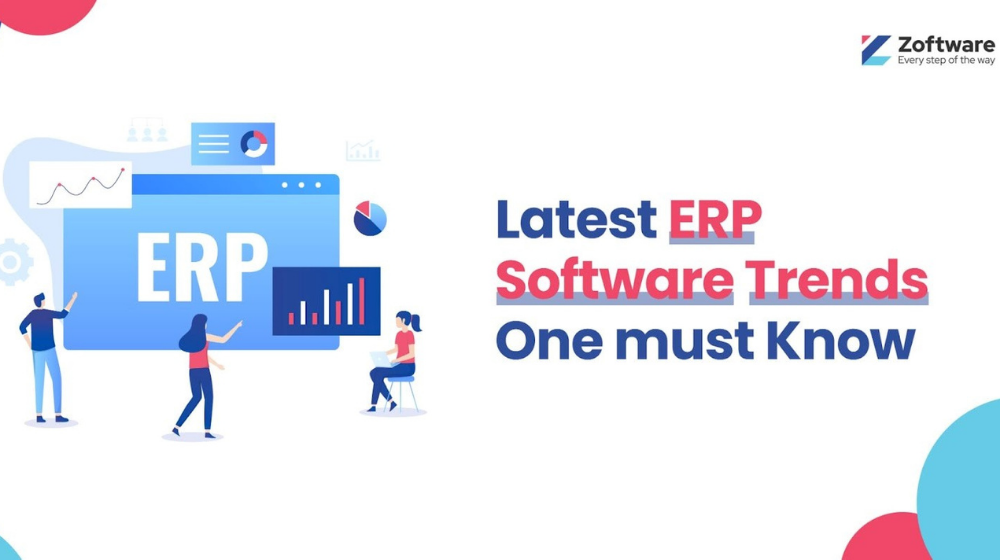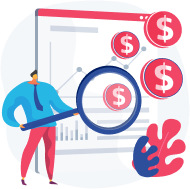40% of businesses cited enhanced functionality as the key motivation for adopting an Enterprise Resource Planning (ERP) system.
This represents the practical usage of ERP Software and its significant role in developing businesses. That’s why people continuously invest in ERP Software and follow different ERP Software trends to advance in today’s highly competitive industry.
In today’s blog, you will learn about the top 10 ERP trends businesses are rigorously following.But before that, let’s understand what ERP software is and its importance.
What is ERP software?
Enterprise Resource Planning (ERP) software consolidates various business operations and departments into a unified system, streamlining processes and enabling seamless data management across finance, HR, supply chain, and customer management. This centralized data approach reduces duplication, improves data precision, and facilitates effective decision-making, ultimately enhancing operational effectiveness. The software is pivotal in simplifying intricate business tasks and elevating organizational productivity.
Importance of staying updated on ERP software trends
- Dynamic Business Environment: In a rapidly changing landscape, staying updated on ERP trends ensures businesses remain agile and adaptable to market shifts.
- Enhanced Efficiency and Productivity: Regular updates allow businesses to leverage new features, promoting efficiency through automation and advanced functionalities.
- Competitive Edge: Being ahead in technology adoption provides a competitive advantage, positioning businesses for success in a fast-paced market.
- Scalability and Flexibility: Updated ERP systems offer scalability and flexibility, adapting to changing business requirements and ensuring continued relevance.
- Cost Savings: Avoiding legacy system pitfalls, updated ERP systems enable efficient resource allocation, leading to cost-effective operations.
- User Experience and Satisfaction: Modern ERP interfaces positively impact user satisfaction, enhancing employee productivity and morale.
- Security and Compliance: Regular updates address cybersecurity challenges, ensuring ERP systems meet compliance standards through the latest security measures.
- Informed Decision-Making: Real-time data and analytics from updated ERP tools empower informed decision-making for strategic business leaders.
- Adaptation to Remote Work Trends: Updated ERP capabilities facilitate remote work, supporting distributed teams and adapting to changing work dynamics.
- Future-Proofing: Staying informed on ERP trends prepares businesses for upcoming challenges and opportunities, future-proofing against technological disruptions.
Top 10 ERP Software Trends
- Cloud ERP
This ERP provides Enterprise Resource Planning (ERP) software and tools via the cloud instead of traditional on-premise systems. This ERP Software trend emphasizes using internet-based platforms, offering greater accessibility, scalability, and cost-effectiveness. Cloud ERP systems are typically easier to implement, update, and maintain.
They allow businesses to access their ERP tools from anywhere, facilitating remote work and collaboration. This model also offers enhanced security features and regular updates, ensuring companies can quickly adapt to changing market needs and technologies. The shift towards Cloud ERP represents a significant move in how enterprises manage their resources, offering more flexibility and efficiency in operations.
- Two-Tier ERP
Among all ERP Software trends, this one involves the simultaneous use of two distinct ERP systems within a single organization. A comprehensive, larger-scale ERP system (Tier 1) is typically implemented at the corporate level to handle essential business operations. At the same time, subsidiaries or individual departments utilize more minor, more adaptable ERP solutions (Tier 2).
This dual approach enables subsidiaries to tailor their ERP systems to meet local or industry-specific demands, providing enhanced customization and flexibility. Doing so avoids the limitations of a uniform solution, aligning ERP capabilities more precisely with the varied requirements across the organization.
- Hyper Automation
In the context of ERP software trends, it is focused on maximizing automation across various business processes. This trend uses artificial intelligence (AI), machine learning, and robotic process automation (RPA) into ERP systems by integrating them.
It enhances the capability of ERP systems to automate complex and repetitive tasks. This leads to increased efficiency, accuracy, and productivity. Hyper Automation enables businesses to streamline their operations and make real-time data-driven decisions. And adapt quickly to changing market demands, ensuring a more agile and competitive stance in the digital era.
- Integrating IoT and Social Media
Among all ERP Software trends, this is a powerful shift in business technology. This integration enables businesses to harness vast data from IoT devices and social media platforms. It provides deeper insights into customer behavior, market trends, and operational efficiency.
ERP systems can offer more accurate and comprehensive analytics by combining IoT’s real-time data capture capabilities with social media’s rich consumer insights. This results in improved decision-making, enhanced customer engagement strategies, and optimized operations, all crucial for staying competitive in today’s rapidly evolving digital landscape.
- Advanced Analytics
As an ERP software trend , it refers to the integration of sophisticated analytical tools and techniques within Enterprise Resource Planning systems. This trend involves leveraging data analytics to derive deeper insights and make data-driven decisions across various business functions.
Advanced analytics in ERP systems can include predictive analytics, machine learning, and complex data processing capabilities.
It enables businesses to forecast future trends, optimize operations, and improve overall efficiency by analyzing large volumes of data from different sources within the ERP system. This approach enhances decision-making and strategic planning, offering a competitive edge in rapidly changing business environments. Please refer to the source articles on ERP trends for more detailed information.
- Industry-Specific ERP Software
As an ERP Software trend, it emphasizes creating ERP systems tailored to the unique requirements of different industries, such as manufacturing, retail, or healthcare. These specialized ERP solutions incorporate features and processes relevant to a particular sector, greatly enhancing operational efficiency and compliance.
This approach moves away from generic ERP models, recognizing the diverse needs across business sectors and the importance of industry-specific customization in improving productivity and user experience.
- Mobile ERP Platforms
This ERP software trend signifies the shift towards making ERP systems accessible and functional on mobile devices. This trend reflects the growing need for business flexibility and the ability to access critical business processes and data from anywhere, at any time.
Mobile ERP solutions offer the convenience of remote access, enabling employees to stay connected with business operations while on the go. This enhances productivity and improves decision-making with real-time data access. It caters to the evolving work environment that increasingly favors mobile and remote work. This trend is part of a broader digital transformation in business technology, emphasizing agility and responsiveness in the modern business landscape.
- Personalized ERP Systems
It marks a shift in ERP software trends, emphasizing customization to meet unique business requirements and user needs. Moving beyond standard solutions, these systems are designed to fit an organization’s specific workflows, data requirements, and processes.
Features like adaptable interfaces, configurable dashboards, and targeted modules cater to individual business functions, enhancing operational efficiency, user involvement, and strategic decision-making, thereby boosting overall business performance.
- Predictive Analytics
Using Predictive Analytics in ERP software trends is significant, as it enhances decision-making and forecasting abilities. Predictive Analytics utilizes historical data, statistical algorithms, and machine learning techniques to identify the likelihood of future outcomes.
This approach in ERP systems helps businesses anticipate market trends, customer behavior, and potential risks. It enables companies to be proactive rather than reactive, optimizing operations, improving customer service, and increasing overall efficiency. Integrating Predictive Analytics makes ERP systems more dynamic and intelligent, providing insights to drive strategic business decisions.
- AI-Powered Insights and Improvements
It refers to integrating Artificial Intelligence (AI) into ERP systems. This integration enhances decision-making and operational efficiency. The AI algorithms analyze large volumes of data, identify patterns, and predict future trends. This capability allows for more informed and strategic business decisions.
AI can automate routine tasks, optimize business processes, and offer personalized recommendations. The goal is to improve productivity, reduce errors, and gain deeper insights into business operations.
Future of ERP Software
The ongoing acceleration of trends such as the shift to cloud ERP, integration with AI and the IoT, and the rise of composable ERP, among others, is set to continue. In the short term, companies will leverage these advancements to enhance agility and navigate the challenges of the permacrisis era. A key focus will be supporting remote and distributed workers through secure and innovative tools.
Looking ahead, ERP systems are poised to evolve into indispensable companions, augmenting human intelligence rather than replacing it. Paul Saunders, Head of Product Strategy for SAP S/4HANA and Chief Evangelist for Cloud ERP at SAP, envisions a future where ERP enhances human decision-making.
The convergence of human and artificial intelligence will redefine interactions with ERP through “intelligent connectivity,” allowing users to shape the system dynamically according to their needs. Additionally, emerging technologies like quantum computing are expected to significantly impact ERP and reshape the landscape of business and work. As change remains the only constant, adaptation becomes essential for us all.
Conclusion
Implementing an ERP (Enterprise Resource Planning) system may seem challenging, but it’s necessary for improved business performance. Fortunately, you don’t have to handle this complex task by yourself. Introducing Zoftware, your reliable ally in this journey.
Based in the Middle East, Zoftware is a specialized platform dedicated to simplifying searching for the perfect ERP software. They assist businesses by helping them define their specific requirements, offering comparisons between various software options, and guiding them toward making informed decisions.
This is facilitated through authentic user reviews, ensuring that the advice and recommendations are grounded in real-world experiences. With Zoftware, finding the right ERP solution for your business is easier and more effective.
Register today at Zoftware to discover the ideal software solution for your business.


